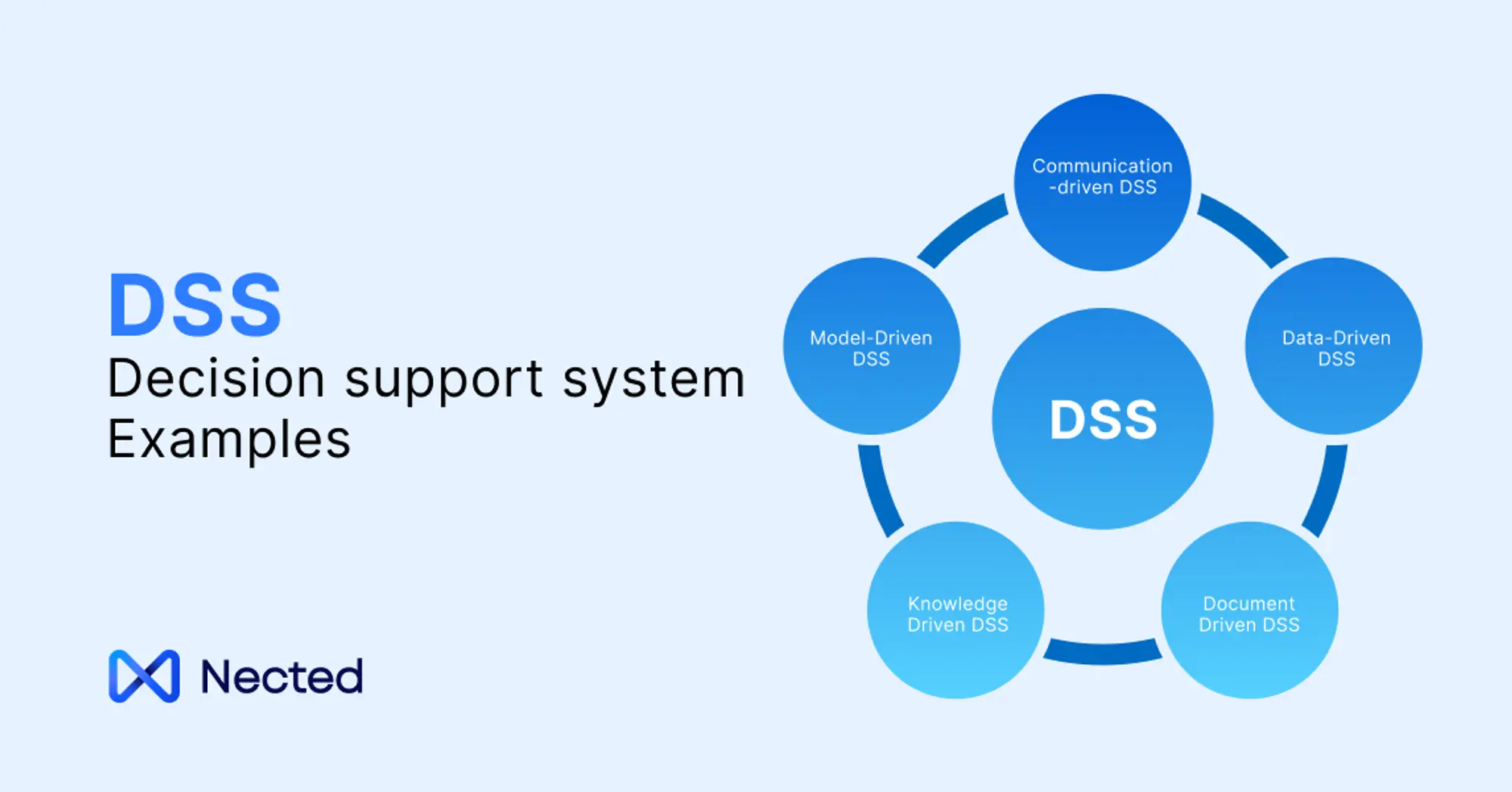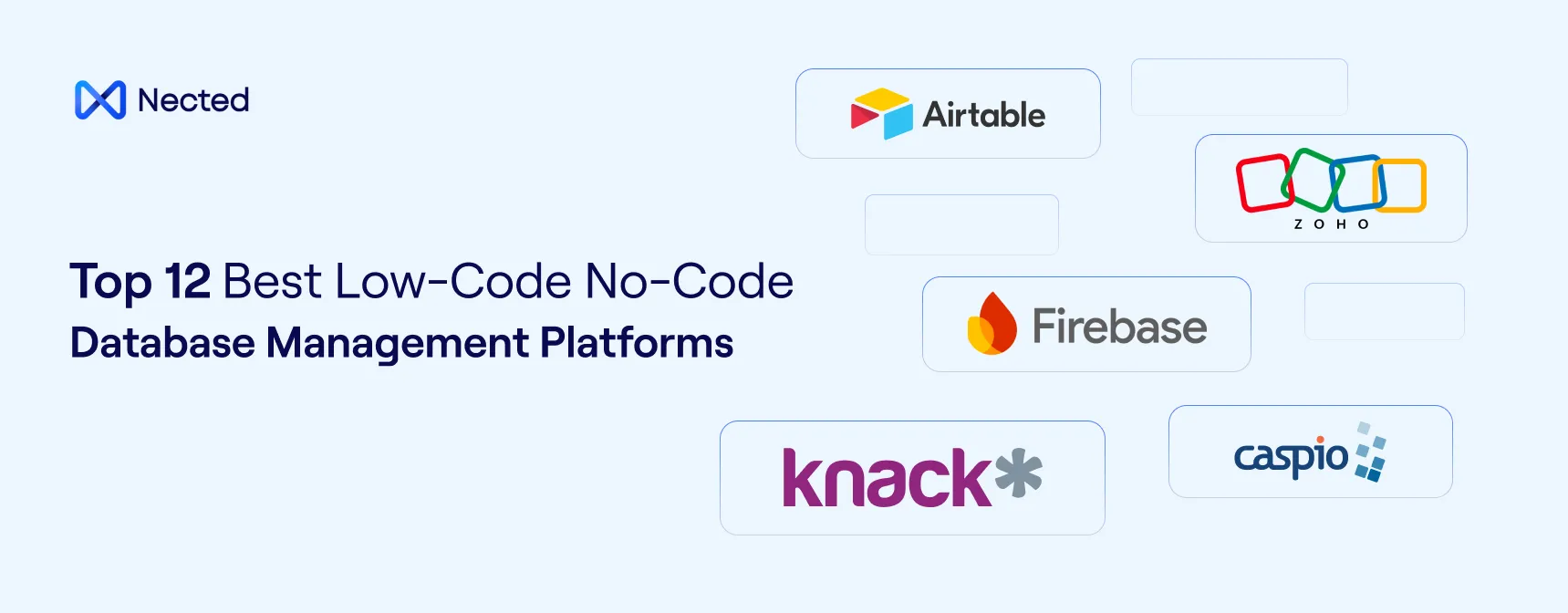Effective decision-making is a cornerstone of success in business and organizational environments. Navigating the complexities of modern data landscapes requires tools that provide timely and accurate insights. This is where Decision Support Systems (DSS) come into play. Designed to aid managers and decision-makers, DSSs are computer-based information systems that compile data, documents, personal knowledge, and business models. They support problem identification and decision-making processes, making them invaluable in today's data-driven world.
In this blog, we will talk about Decision Support Systems in detail. We will discuss their key characteristics, components, and various types, and provide real-world examples. Additionally, we will delve into the numerous benefits these systems offer, demonstrating their importance in enhancing decision-making efficiency and effectiveness.
What is a Decision Support System?
A Decision Support System (DSS) is a computer-based information system that supports business or organizational decision-making activities. DSSs help managers and other decision-makers compile useful information from raw data, documents, personal knowledge, and business models to identify and solve problems and make decisions.
DSSs are interactive software-based systems that help users analyze large volumes of information and access data from various sources to support semi-structured and unstructured decision-making. They provide an interactive interface that allows users to manipulate data, adjust parameters, and explore different scenarios. The primary purpose of a DSS is to assist decision-makers in making informed choices by providing relevant data, analyses, and insights. Below are the key characteristics of a DSS:
- Interactive: DSSs provide an interactive interface that allows users to manipulate data, adjust parameters, and explore different scenarios. This interactivity is essential for testing various hypotheses and understanding the potential outcomes of different decisions.
- Support for Decision-Making: The primary purpose of a DSS is to assist decision-makers in making informed choices. This support is provided through relevant data, analyses, and insights that help evaluate different options and select the best course of action.
- Modeling and Analysis: DSSs incorporate various models, algorithms, and analytical tools to process data and generate insights. These tools can include predictions, simulations, and optimization solutions that help understand complex situations and make better decisions.
- User-Friendly Interface: DSSs offer intuitive and easy-to-use interfaces, making them accessible to non-technical users. This user-friendliness ensures that decision-makers can effectively interact with the system and utilize its capabilities without needing extensive technical knowledge.
Components of a DSS
The key components of a Decision Support System (DSS) work together to give a comprehensive solution for accurate decision-making. These components include:
- Data Management: This component involves gathering, storing, and organizing relevant data from various sources. Efficient data management ensures that the DSS has access to accurate and up-to-date information, which is critical for making informed decisions.
- Modeling and Analysis Tools: DSSs use models, algorithms, and analytical techniques to process data and generate insights. These tools help in transforming raw data into meaningful information that can be used for decision-making.
- User Interface: The user interface presents data, visualizations, and results in a user-friendly manner. It enables users to interact with the system, input data, and view the analysis results, facilitating an effective decision-making process.
- Database Management System (DBMS): The DBMS manages the storage and retrieval of data for the DSS. It ensures that data is stored securely and can be accessed quickly when needed, supporting the overall functionality of the system.
- Knowledge Base: The knowledge base stores domain-specific knowledge, rules, and guidelines that support decision-making. This component provides the DSS with the contextual information needed to interpret data and generate relevant insights.
- Communication and Collaboration Tools: These tools enable the sharing of information, analysis results, and scenarios among team members. Effective communication and collaboration are essential for ensuring that all stakeholders are involved in the decision-making process and can contribute their expertise and perspectives.
Decision Support Systems are essential tools that enhance decision-making by providing interactive, data-driven, and user-friendly solutions. By understanding their characteristics and components, organizations can leverage DSSs to make more informed and effective decisions.
Read Also: Fraud Detection: A Comparative Analysis with Neo4j and Nected
Types of Decision Support Systems
Decision Support Systems (DSS) are categorized based on the nature of the support they provide and the methods they employ. Understanding the different types of DSS helps organizations choose the right system to meet their specific decision-making needs. Here are the primary types of DSS:
1. Document-Driven DSS
Document-Driven Decision Support Systems focuses on managing and providing access to textual information that is crucial for decision-making. These systems organize and retrieve documents such as reports, research papers, and policy documents. By leveraging document management technologies, a Document-Driven DSS ensures that decision-makers have easy access to necessary information. Legal advisory systems where lawyers need to quickly find relevant case laws and legal documents to support their arguments.
2. Data-Driven DSS
Data-Driven Decision Support Systems emphasize the analysis and visualization of data to aid decision-making. These systems use data from internal and external sources to generate insights. They often employ business intelligence tools and data visualization techniques to help users identify patterns, trends, and relationships in large datasets. Business intelligence platforms that analyze sales data to identify market trends and forecast future sales.
3. Knowledge-Driven DSS
Knowledge-Driven Decision Support Systems incorporate expert knowledge and rules to support decision-making processes. These systems leverage artificial intelligence and machine learning to provide recommendations based on domain-specific knowledge. They are particularly useful in areas where decision-making relies heavily on expertise and established guidelines. Medical diagnosis systems that provide treatment recommendations based on patient symptoms and historical medical data.
4. Model-Driven DSS
Model-Driven Decision Support Systems rely on mathematical and analytical models to support decision-making. These systems use models such as financial forecasts, optimization models, and simulation tools to analyze complex scenarios and predict outcomes. Model-driven DSSs are valuable in situations that require detailed quantitative analysis. Financial planning tools that help organizations create budgets and perform scenario analysis to understand potential financial outcomes.
5. Communication-Driven DSS
Communication-Driven Decision Support Systems focus on enabling collaboration and communication among team members to support decision-making. These systems provide tools for sharing information, discussing options, and collectively making decisions. Communication-driven DSSs are essential for facilitating teamwork and ensuring that all stakeholders are involved in the decision-making process. Collaboration platforms that enable remote teams to share project updates, discuss strategies, and make collective decisions.
Organizations can select the most appropriate DSS to address their specific decision-making needs. Each type offers unique capabilities and benefits, enhancing the overall effectiveness of the decision-making process.
Types of DSS and Use Cases
| Type of DSS | Key Features | Example Use Cases |
|---|---|---|
| Document-Driven DSS | Manages and retrieves textual data and documents | Legal document search systems, policy review tools |
| Data-Driven DSS | Aggregates, analyzes, and visualizes large datasets | Market trend analysis, sales forecasting |
| Knowledge-Driven DSS | Applies expert knowledge and AI rules | Medical diagnosis platforms, customer support systems |
| Model-Driven DSS | Uses mathematical models for simulation and prediction | Financial planning, supply chain optimization |
| Communication-Driven DSS | Facilitates collaboration and decision-making among teams | Project management tools, virtual meeting platforms |
Suggested Read: Implementing Automated Decision Management Software for Regulating Industries
Decision Support System Examples
DSS provide critical assistance across various industries by offering data-driven insights and aiding complex decision-making processes. Here are some notable decision support system software examples:
1. Sales Forecasting
Sales forecasting DSSs analyze historical sales data, market trends, and other influential factors to generate accurate sales predictions. These systems help organizations plan their sales strategies, allocate resources effectively, and set realistic sales targets.
A retail company uses a DSS to forecast holiday season sales by analyzing past sales data, current market trends, and promotional impact. This helps the company optimize inventory levels and schedule staffing accordingly.
2. Inventory Management
Inventory management DSSs assist organizations in optimizing their inventory levels. By analyzing demand patterns, lead times, and other variables, these systems help make informed decisions about ordering, stocking, and distribution, ensuring a balance between inventory costs and availability.
An e-commerce platform uses a DSS to monitor inventory levels in real-time, predict future stock requirements based on historical sales data, and automate reorder processes to prevent stockouts or overstocking.
3. Financial Planning and Analysis
Financial planning and analysis DSSs support financial modeling, budgeting, and scenario analysis. These systems help organizations evaluate financial performance, plan budgets, and analyze the impact of different financial strategies on their overall goals.
A manufacturing company employs a DSS to create detailed financial models for budgeting. The system simulates various economic scenarios, helping the company prepare for potential market fluctuations and make strategic financial decisions.
4. Supply Chain Optimization
Supply chain optimization DSSs enhance the efficiency of supply chain operations by analyzing logistics, transportation, and supplier performance data. These systems help organizations make informed decisions about sourcing, distribution, and inventory management, leading to cost savings and improved service levels.
A global logistics provider uses a DSS to optimize its supply chain routes by analyzing data on transportation costs, delivery times, and supplier reliability. This enables the provider to choose the most efficient routes and improve delivery performance.
5. Healthcare Decision Support
Healthcare DSSs aid medical professionals in making clinical decisions by providing access to patient data, treatment guidelines, and predictive analytics. These systems support diagnosis, treatment planning, and patient management, leading to improved patient outcomes.
Like, a hospital uses clinical decision support tools to assist doctors in diagnosing diseases. The system analyzes patient symptoms, medical history, and current treatment guidelines to recommend potential diagnoses and treatment plans, enhancing the accuracy and speed of medical decisions. Examples of clinical decision support tools include BMJ Best Practice, DynaMed, UpToDate, RAMPmedical's therapy decision support platform, Medical Algorithms Company's evidence-based analytics, and Cohesic's guided clinical workflows.
So, these are the applications of Decision Support Systems across different sectors. By leveraging DSSs, organizations can enhance their decision-making processes, leading to better outcomes and increased efficiency.
Read Also: The Power of Data: Data Science Solutions for Fraud Detection & Prevention
Conclusion
Decision Support Systems (DSS) are indispensable tools that empower organizations to make informed, efficient, and strategic decisions. By integrating data, models, and user-friendly interfaces, DSSs provide critical insights that enhance decision-making processes across various domains. From sales forecasting and inventory management to financial planning and healthcare, the applications of DSSs are diverse and impactful.
Understanding the different types of DSS—Document-Driven, Data-Driven, Knowledge-Driven, Model-Driven, and Communication-Driven—enables organizations to select the most suitable system for their needs. The benefits of implementing DSSs are substantial, including improved decision-making, enhanced efficiency, increased competitiveness, better risk management, and improved collaboration.
As businesses navigate the complexities of the modern data landscape, adopting Decision Support Systems can be a game-changer. By harnessing the power of DSSs, organizations can achieve greater accuracy, speed, and effectiveness in their decision-making processes, ultimately driving success and growth.
FAQs
1. What is a Decision Support System with Examples?
A Decision Support System (DSS) is a computer-based information system that supports business or organizational decision-making activities. DSSs help managers and other decision-makers compile useful information from raw data, documents, personal knowledge, and business models to identify problems, evaluate options, and make informed decisions.
Some examples of DSS include:
- Sales Forecasting: Analyzing historical sales data and market trends to generate accurate sales forecasts for strategic planning.
- Inventory Management: Optimizing inventory levels by analyzing demand patterns and lead times to inform ordering and distribution.
- Financial Planning and Analysis: Assisting in budgeting, financial modeling, and scenario analysis for strategic finance decisions.
- Supply Chain Optimization: Improving sourcing, transportation, and supplier performance decisions through data analysis.
- Healthcare Decision Support: Supporting clinical decisions with access to patient data, treatment guidelines, and predictive analytics.
2. What is an Example of a Group Decision Support System?
A Group Decision Support System (GDSS) facilitates decision-making by multiple participants. Examples include:
- Decision Room: A technology-enabled space where participants interact with shared information simultaneously using networked computers and projectors, enabling collaborative input and analysis.
- Delphi Approach: A structured communication method where experts answer questionnaires in rounds and revise their responses based on group feedback, aiming to reach consensus.
3. What is a Support System Example?
Other support system examples include:
- GPS Route Planning: Calculates optimal routes with real-time traffic avoidance.
- Crop Planning Tools: Help farmers decide on planting, fertilizing, and harvesting times.
- Medical Diagnosis Software: Assists healthcare professionals in diagnosing illnesses.
- Descriptive and Diagnostic Analytics: Report past performance and analyze reasons behind outcomes.
- Business Intelligence (BI): Provides insights and query tools based on historical data to support decision-making.
4. What industries benefit most from DSS?
Industries that gain significant advantages from DSS include:
- Healthcare: Clinical decision-making and patient management.
- Retail and E-commerce: Sales forecasting, inventory optimization, and customer analytics.
- Finance: Budgeting, risk assessment, and financial scenario planning.
- Logistics and Supply Chain: Route planning, demand forecasting, and supplier performance.
- Legal and Professional Services: Document management and case analysis.
5. How to choose a DSS?
To select the right DSS:
- Identify decision-making needs and the complexity/type of decisions.
- Evaluate data requirements ensuring the DSS can access all necessary internal and external data.
- Consider integration and scalability with existing systems and future growth.
- Assess user interface and usability for the intended user base.
6. When to implement a DSS?
Ideal times to implement a DSS are:
- When decision-making becomes complex or data volume increases significantly.
- When faster and more accurate decisions are critical for competitiveness.
- When there is a need for enhanced collaboration and transparency across teams.
- During business growth phases or when improving decision workflows.
This expanded FAQ provides comprehensive and practical guidance on DSS concepts, examples, industry applications, selection, and implementation considerations, supporting readers in understanding and utilizing decision support systems effectively.



.svg)




.png)






.svg.webp)











.webp)


%20m.webp)
.webp)


.webp)
.webp)






%20(1).webp)
